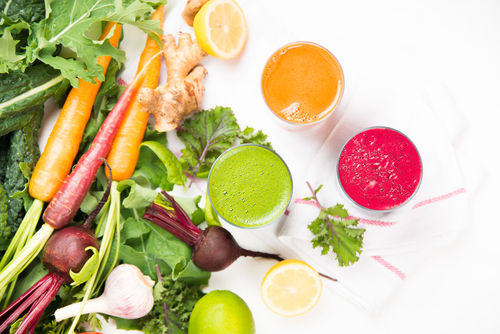
WORK IT OUT WEDNESDAY: The Juicy Truth On Cleanses
Fresh pressed juices are all the rage.
There are stores on almost every corner, even here in Hoboken. You can find some great juices in town that are filled with antioxidant, vitamins, and more at Buddha Press, FreshU, and recently opened Simply Juiced.
While juice bars offer customers the option to sip on beverages that are either water, dairy/non-dairy based with fruits, vegetables and herbs, there’s a whole other sector of juices out there claiming to ‘cleanse’ you through a multiple day detox.
So what is all the hoopla about ‘cleansing’? Can a juice really clean your body out? Is it healthy? We took the top three questions that we always hear from our clients and broke them done into the truth of the matter.
Does your digestive system need a break?
Your digestive system doesn’t need a break, but it does need to be treated kindly.
The benefits of a juice cleanse is the amount of fiber you will most likely receive by drinking vegetables and fruits. Fiber is the golden ticket to a happy and healthy digestive system. This is the nutrient that well…makes you poop, and that’s a good thing. It is removing waste from your system, and allowing room to be accessible for nutrients your body needs to rebuild itself. Most Americans receive only 15-grams of fiber per day, however recommended amounts for men are 38-grams/day and for women 25-grams/day.
Your body, especially your digestive system, is working all the time, and that’s what its intended function is – to be a workhorse. You do not need to give it a break, but you need to fill it with the proper ingredients to keep it working efficiently, like fiber, but also fluids, such as water. Generally, the goal is 8-12 glasses of water a day. Additionally watching your fat intake. Fat can wreck havoc on your digestive system and back up daily functions, allows for calories to be used inefficiently by the body. Strive to limit your fat intake to 20% of your daily calories, which is approximately 44-grams per day.
Can you subsist on juices for multiple days?
No matter what you read on the label or marketing materials, it is not recommended.
Your body needs a certain amount of calories to work efficiently and effectively to support all your major organs and muscles. If you are an active, male calories can range from 2,000 – 2,500 and for women, anywhere from 1,500 to 2,000 calories per day.
When you scale back your calorie intake significantly, your body will go into starvation mode and start conserving calories, rather than using them, because it isn’t sure whether there will be more fuel coming its way. This action by your body is counterintuitive to weight loss. You want to feed your body consistently, so your metabolism works regularly and at its appropriate rate, rather than slowing itself down in an effort to conserve.
Is the weight loss real?
Unfortunately, no.
You will see a change on the scale, but that is a reflection of lost water weight. While on a juice cleanse you are consuming a low amount of calories, along with the high concentration of vegetables and fruits, that are also dense with water. This allows your body to flush not only the water you are consuming, but also any additional water you are carrying in your system, that is not being absorbed by whole foods.
Once you begin to eat normally, post-cleanse, it is highly likely that you will see this weight return.
Here is what we recommend at Work it Out, and always advise clients who are participating in our Wellness programs:
Eat fresh foods, limit processed foods, and practice proper portion size
With those three small rules, you’ll be able to treat your body properly, give you digestive system some TLC, enjoy the food you eat, and along the way lose some unnecessary weight.
Lisa Bruno is the co-founder and director of business development at Work it Out Fitness Studios<http://www.workitoutgym.com> in Hoboken. Bruno is an avid fitness and nutrition enthusiast (and has been since a very young age). She holds a bachelor’s degree in Food & Nutrition and is currently pursuing her certification as a Registered Dietitian.

 Previous Article
Previous Article Next Article
Next Article hMIXER Thursday @ Tilted Kilt!!!
hMIXER Thursday @ Tilted Kilt!!!  MERRY MILE SQUARE: Hoboken Happy Hours and Hoboken FC Raise Pints and Funds for Covenant House—SATURDAY
MERRY MILE SQUARE: Hoboken Happy Hours and Hoboken FC Raise Pints and Funds for Covenant House—SATURDAY  Hoboken Celebrates the 105th Annual St. Ann’s Festival
Hoboken Celebrates the 105th Annual St. Ann’s Festival  MOVING ON: Hoboken Hothouse Changing Hands as Proprietor Karen Nason Eyes New Project
MOVING ON: Hoboken Hothouse Changing Hands as Proprietor Karen Nason Eyes New Project  hOMES: Your Weekly Insight into Hoboken Real Estate Trends | FEB. 26-MAR. 3, 2016
hOMES: Your Weekly Insight into Hoboken Real Estate Trends | FEB. 26-MAR. 3, 2016  FEATURED PROPERTY: 1234 Garden Street; Stunning Hoboken Brownstone — $3,100,000
FEATURED PROPERTY: 1234 Garden Street; Stunning Hoboken Brownstone — $3,100,000  REVIEW: Mile Square Theatre’s “7th Inning Stretch” Goes Deep
REVIEW: Mile Square Theatre’s “7th Inning Stretch” Goes Deep  Get Pumped, Hoboken: Flood Mitigation Plan Passes
Get Pumped, Hoboken: Flood Mitigation Plan Passes